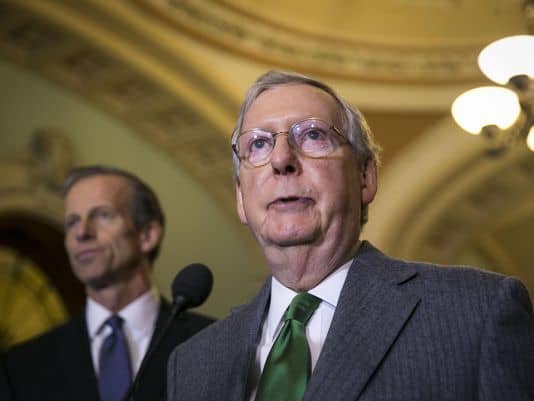Their tax bill triumph in the rear-view mirror, Republicans running Congress face a 2018 in which they’ll need Democratic votes to get almost anything done.
And that won’t be easy. Short of a few must-pass items, divisions within both parties plus a natural election-year tendency to draw distinctions with the other side means achievements and cooperation will be minimal.
The pressure will be on the GOP, which controls the White House, Senate and House and would probably be blamed by voters for any major screw-ups. Since Republicans will have just a 51-49 Senate majority next year — well shy of the 60 votes needed to pass most bills — Democrats will have leverage for most things, including a deal to prevent a politically jolting January federal shutdown.
“There’s not much you can do on a partisan basis in the Senate,” Senate Majority Leader McConnell, R-Ky., conceded to reporters Friday.
Topping McConnell’s immediate list will be a spending bill averting a shutdown and providing big boosts for the Pentagon. In exchange, Minority Leader Chuck Schumer, D-N.Y., will be demanding comparable increases for domestic spending. Schumer also wants a deal to extend protections that President Donald Trump has threatened to halt for immigrants brought to the U.S. illegally as children, the so-called Dreamers.
Factored into Democrats’ thinking: their recent momentum-building successes swiping a Senate seat in Alabama, holding governorships in Virginia and New Jersey and grabbing unexpected local legislative seats. With Trump’s profound unpopularity weighing down the GOP across the country, Republicans face a legitimate risk of losing House and Senate control in the November midterm elections.
McConnell said he’ll be looking for bipartisan cooperation on immigration and an effort to ease parts of the Dodd-Frank law that regulates financial market, but Democrats won’t be eager to shake hands quickly.
“For Democrats, there’s no reason to cut a deal just for the sake of cutting a deal, especially with the Republican Party as weakened as it is right now,” said Jim Manley, a Democratic consultant.
Also in play in January will be money to keep nearly 9 million low-income children in all 50 states covered by the Children’s Health Insurance Program, an extension of a law allowing U.S. surveillance of foreigners overseas and tens of billions of dollars for recovery from storms and other disasters in Texas, Florida, Puerto Rico and elsewhere.
Even as GOP leaders plot their broader 2018 agenda, they’ll need to cautiously seek a sweet spot between showing hard-core Republican voters that they’re pursuing conservative goals and protecting their more centrist and vulnerable members from damaging votes.
That will be complicated by internal divisions. Already, McConnell and his House counterpart, Speaker Paul Ryan, R-Wis., seem to be contemplating divergent pathways.
Ryan, whose Republicans are generally more conservative than GOP senators, has talked about overhauling benefit programs like welfare, Medicaid and parts of Medicare. Reining in those ever-growing programs has long been a priority for Ryan and his party, but targeting popular entitlements in an election year can be risky. McConnell signaled this week that he’s not likely to do that.
“We’ll not be doing entitlement reform unless we have enough Democratic support to achieve it,” McConnell said in an interview, citing a condition that seems just shy of implausible.
The year just ending underscored the limits of unity within both parties.
Republicans rallied around their $1.5 trillion tax overhaul, a primary plank of GOP ideology for decades. They also banded together to confirm the nominations of Supreme Court Justice Neil Gorsuch and other top federal judges and to peel back 14 rules enacted during the final months of Barack Obama’s presidency dealing with guns, the internet, education and the environment.
But Republicans splintered when it came to their failed effort to erase Obama’s health care law. And they face internal divides over issues like spending, where hard-right members of the House Freedom Caucus can be single-minded in their desire to slash spending and defy leadership efforts to strike compromises inevitably needed with Democrats.
“The only difference that mitigated the December difficulties is we passed a historic tax reform bill,” said Rep. Mark Meadows, R-N.C., who leads the Freedom Caucus. “We’re not going to have an historic tax reform bill to fall back on in January, so now it gets down to some very difficult decisions on how we move forward.”
Democrats also face splits over how aggressively to pursue their agenda, particularly immigration.
While party leaders like Schumer work toward reaching an agreement with Republicans, some liberals and members of the party’s Congressional Hispanic Caucus accuse them of not being assertive enough.
In one tell-tale look at that rift, 17 Senate Democrats — including several seeking re-election next year from GOP-leaning states — voted Thursday for the bill that prevented a federal shutdown this weekend.
Twenty-nine Democrats voted “no,” including some of the most liberal members and potential presidential contenders. They included Sherrod Brown of Ohio, New Jersey’s Cory Booker and Massachusetts’ Elizabeth Warren. Schumer joined them.
(AP)












One Response
They can still confirm appointees, but probably won’t be able to pass any new legislation. If the tax turns out to be a tax on poor people, the Republicans are doomed anyways. If the response to the tax by most Americans (e.g. the 2/3 who never itemized and benefit the most) is postiive, the Republicans will win the mid-term election and can pass whatever they want in 2019.